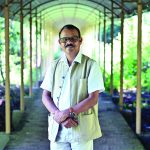The phone call that Mom received on that fateful evening was the harbinger of a somber chapter that would unfold in our lives. Nana, our beloved grandmother, was unwell – seriously unwell. The urgency in my aunt’s voice was palpable as she relayed that Nana’s children, scattered across the world, were making their way back to her side. Even in the face of this distressing news, the specter of family dynamics emerged; the undertone of greed, of sibling rivalry, was undeniable. Yet, we too joined the pilgrimage to Nana’s side.
Stepping off the plane at Dabolim Airport, the warm Goan air was a stark contrast to the weight in my chest. There stood my cousin Keith, usually a source of laughter and mirth, his demeanour now subdued and solemn. His connection to Nana had been a special one, spending more time with her than the rest of us when his father Lenon – my uncle – faced visa issues and had to stay in Goa.
It was clear that Keith knew something we didn’t, that his grief was already being processed, whereas ours was just setting in. I had learned that Nana’s condition was far worse than we had been led to believe, the facade of her pretending to be sick crumbling in the face of Keith’s quiet sorrow.
Nana, whose full name was Audrey Fay D’silva, was a matriarch with three children. Lenon, my uncle, lived in Lisbon, working as a chef. My mother, a doctor, was settled in London, and married to my English stepfather. Then there was Aunt Lina, who had married a Goan man and settled in the US. Nana lived with Maria, a caretaker who had been with her since her husband Anthony Phil D’silva’s passing seven years ago.
Upon reaching Nana’s home – a charming old Portuguese-style bungalow – the gravity of the situation sank in further. The family had gathered in various corners of the house, discussions about rooms and logistics echoing. Aunt Lina and Uncle Lenon were engrossed in conversation when we arrived, yet their solemn expressions communicated volumes about the direness of the situation.
In time, we found ourselves standing at Nana’s bedroom door. Her presence was a paradox – a pale and frail figure cocooned under a fluffy fur blanket. Maria, ever present, sat by her side, crafting a crochet masterpiece that would find its way to an income. Nana was struggling, her memories fleeting, her breath laboured. My mother held her hand tenderly, as though it were the most delicate of porcelain, her eyes betraying both sorrow and love.
The following hours were a blur. We left Nana to rest under Maria’s watchful eye and took the chance to freshen up ourselves. That night, as sleep beckoned, my mother and I were granted the privilege of occupying Nana’s room. My mother claimed the bed, and I, not minding, nestled onto the couch.
The dawn arrived with its own cacophony. I awoke to the urgency in my mother’s voice as she frantically inquired about Nana’s whereabouts. Nana, it seemed, had wandered into the garden. A sense of déjà vu swept over me as I joined the search party.
Amidst the bushes of vibrant roses, Nana stood – a frail silhouette against the backdrop of her cherished blooms. She seemed both lost and at home, an enigma in her own garden. We provided her with a seat, and a quiet understanding passed between us. Her gaze was fixed upon the roses, a quiet pride in their beauty. I walked over and touched a delicate petal, a silent presence beside her.
Engaging her in conversation, she shared her love for these blooms, her voice carrying a sense of reminiscence. And then, she mentioned Rose – her daughter, my mother’s twin, who had lived for a mere two weeks before leaving this world. The weight of this revelation was profound, unveiling a hidden chapter of our family history.
As Nana’s health deteriorated, she was taken to the hospital, her departure inevitable. The days that followed were a haze, a mix of grief, consolation, and reflection. Keith bore the heaviest burden, his eyes telling stories of sleepless nights and unspoken pain. I stayed close, understanding that sometimes the best way to support was to be a quiet presence.
Amid the waves of sorrow, a new wave of realization hit us when Nana’s will was read. It was as though she had meticulously woven her legacy into every aspect of her life, even in her departure. She left behind her children, not material possessions or wealth, but the very essence of her being – the roses that she had tended to with such care. The lawyer’s words reverberated through the room: “She has left you roses.” The initial confusion transformed into clarity, a testament to Nana’s love and her indomitable spirit.
In the end, what mattered were not the worldly possessions, not the bank accounts or the properties, but the moments shared, the memories created, and the fragrant roses that whispered of a love that transcended time and space.
————————————————————————————————————————————-
Written By: Komal Halwai (2nd year BA student at Parvatibai Chowgule College of Arts and Science, Borda, Margao)








